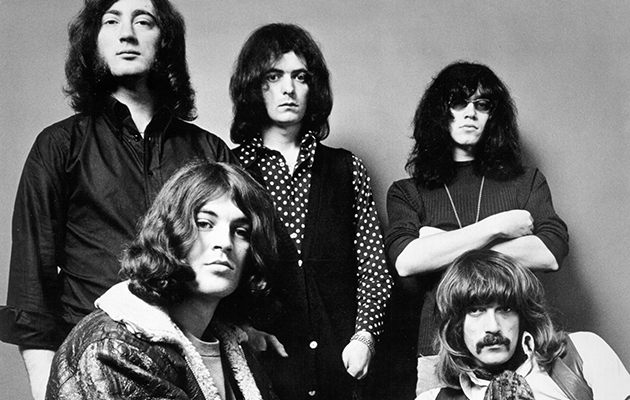GLOVER: I didn’t really know them before I joined, but I knew they’d been a hit in the States. Ian Gillan and I had a songwriting partnership. They offered him the gig and a bit later, they gave me the gig. My audition was recording a song called “Hallelujah”. At the end, Jon Lord came up and said, “We’ve had a chat, would you like to join our band?”
PAICE: In Rock was a leap forward by virtue of the fact that Roger and Ian could create something from nothing – Ian, his off-the-wall lyrics, and Roger, he’s an amazing creator of riffs. With the virtuosity of Ritchie and Jon, it lent itself to so many options musically. Within a couple of weeks of rehearsing and writing it was obvious there was going to be a totally different outcome. It was very satisfying… you never knew what was going to happen next.
GLOVER: There was an incredible chemistry at those first writing sessions. “Speed King” was written on the first day, then “Child In Time” on the first or second day – in this old gym in Hanwell on the outskirts of London.
PAICE: We didn’t say we needed a single – management said we needed a single. They said, “You’ve got a day off between these two shows, why don’t you go into De Lane Lea and knock out a single?” That was how they thought you did it. You just go in there and come out with something wonderful, and they’d make a lot of money.
GLOVER: Jon had had his day with Concerto For Group And Orchestra, and I think that rankled a bit with Ritchie, as they were co-partners of the whole affair. We did it, but once that was done, Ritchie said, “It’s hard rock now. If it’s not dramatic or exciting, it doesn’t belong on this album.” So they were the kind of bywords for the album. “Black Night” was written after In Rock was finished, and the management said, “We need a single.” We were a bit pompous, a bit like “Well, we’re an albums band, not a singles band…” So they said, “OK, let’s not call it a single, let’s call it a ‘lead track’.” So we went to De Lane Lea for a day to record a lead track.
PAICE: So we duly went into the studio at 10am, without an idea. We jammed all day, and by 6pm we had zilch, so we said, “Shall we go and have dinner?” So we went and had dinner, came back again, and again… zilch. So at about 9.30, we said, “Enough of this. Shall we go to the pub?” Round the corner was a nice, happy little boozer called the Newton Arms [33 Newton St, London WC2], so we drank far more than was good for us – not paralytic, but certainly losing touch with reality. Then we went back to the studio.
GLOVER: I seem to remember Ian Gillan attempted to clear the top shelf of the rare bottles. We got good and drunk, then Ritchie and I went in the studio first – he played the riff, and I said, “That’ll do…” and he said, “No, I was just playing Ricky Nelson’s ‘Summertime’.” I said, “Well, I’ve never heard it, let’s do it anyway.”
PAICE: Well, we weren’t thinking too clearly at this stage of the game, so we thought, ‘That sounds all right…’ So we started on that. Jon was getting these nice chords. Ritchie said, “We need some drum fills.” And, we’d lost interest by this point, so I thought, ‘What won’t fit?’ So there’s this bluesy shuffle, and I decided to break the four beats into three. The fills worked against the part of the song, and each time one came, they became more complex. So now at least, Ian had something to work with. But he was in the same state as the rest of us.



